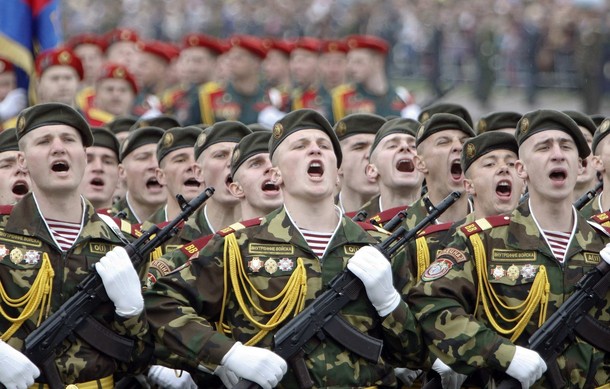
From Joshua Kucera, Eurasianet.org: “For a long time, Russia had a very uncertain position with the CSTO: it wanted allies, but it didn’t want to have to pay,” Yevgeny Buzhinsky, a retired general who until last year headed the Russian Ministry of Defense’s International Cooperation Directorate, told EurasiaNet.org.
“When I was in my last position, I tried to convince two ministers of defense and two chiefs of general staff that if you want to have allies, you have to pay, like the Americans do – if they wanted to have allies in Europe, they paid,” Buzhinsky continued. “Now it seems to me that the political decision has been taken that Russia is ready to pay. So the plan now is to strengthen the CSTO and make it a real political/military alliance. . . .”
Belarussian President Aleksander Lukashenko, whose country currently heads the CSTO, suggested recently that the organization’s rapid reaction forces could be used to put down internal rebellions. “The matter is not only the use of the rapid reaction force in the event of interference from states outside [the CSTO], but also interference from other states within the organization,” he said. “No one will unleash a war on us, but many are itching to stage a constitutional coup.”
Makarov’s and Lukashenko’s statements have caused many observers to wonder if the Kremlin is looking at the CSTO’s rapid reaction force – which will be dominated by Russia, by far the strongest military in the CSTO – as a tool to potentially put down popular uprisings against its authoritarian allies in Central Asia.
Some analysts question Moscow’s desire to get involved in Central Asian domestic disputes, citing Russia’s reluctance to intervene in the Kyrgyz upheaval during the summer of 2010. “The goal [for Russia] is to strengthen the governments of Central Asia so they can put down an uprising themselves,” said Igor Korotchenko, director of the Center for the Analysis of Global Arms Trade, a Moscow think tank affiliated with the Russian Ministry of Defense.
Referring to Russia’s rebuff of Kyrgyz pleas for assistance last summer, Korotchenko said; “If their army can’t do it itself, Russia and Belarus won’t do it.”
“Our guys are afraid to go there – we can’t tell an Uzbek from a Kyrgyz,” added Arkady Dubnov, a Russian journalist and Central Asia expert. Dubnov argued that rhetoric about an Islamist threat in Central Asia is a pretext to allow Russia more subtly to gain influence in the region. “Everyone knows that the Taliban won’t cross from Afghanistan into Central Asia, but everyone claims that’s the threat,” he said. “It’s rhetoric. We want to scare them so much that they let us in in advance; we want presence, not war.”
But the CSTO is, nevertheless, preparing for war. The scenario of the Tsentr-2011 exercises, though ostensibly designed to counter small groups of terrorists, had many components that suggested preparations for more conventional military operations. There was an air defense exercise, for example, and Russia’s entire Caspian Sea Flotilla was involved, even though Islamist terrorists are unlikely to use air or naval forces. (photo: Reuters)
Image: reuters%205%2026%2010%20Belarussian%20troops%20in%20Minsk%20parade.jpg
